Overview
Buf Studio is an interactive web UI for all your gRPC and Protobuf services stored on the Buf Schema Registry. With Buf Studio you can:
- Select an endpoint from any BSR module to send requests to either gRPC or Connect APIs.
- Use the editor with schema-based autocompletion, validation and documentation to draft JSON based request messages.
- Configure headers to further customize outgoing requests.
- Optionally include cookies in outgoing request to send authenticated requests to private APIs (or Buf Studio Agent instances).
- Create shareable links for requests defined on Buf Studio to team members with access.
Composing Requests
Start by selecting the Protobuf method you're looking to make a request with. With the "Select Method" menu you can choose a BSR module and use Buf Studio's fuzzy search to select the desired service and method for you request:
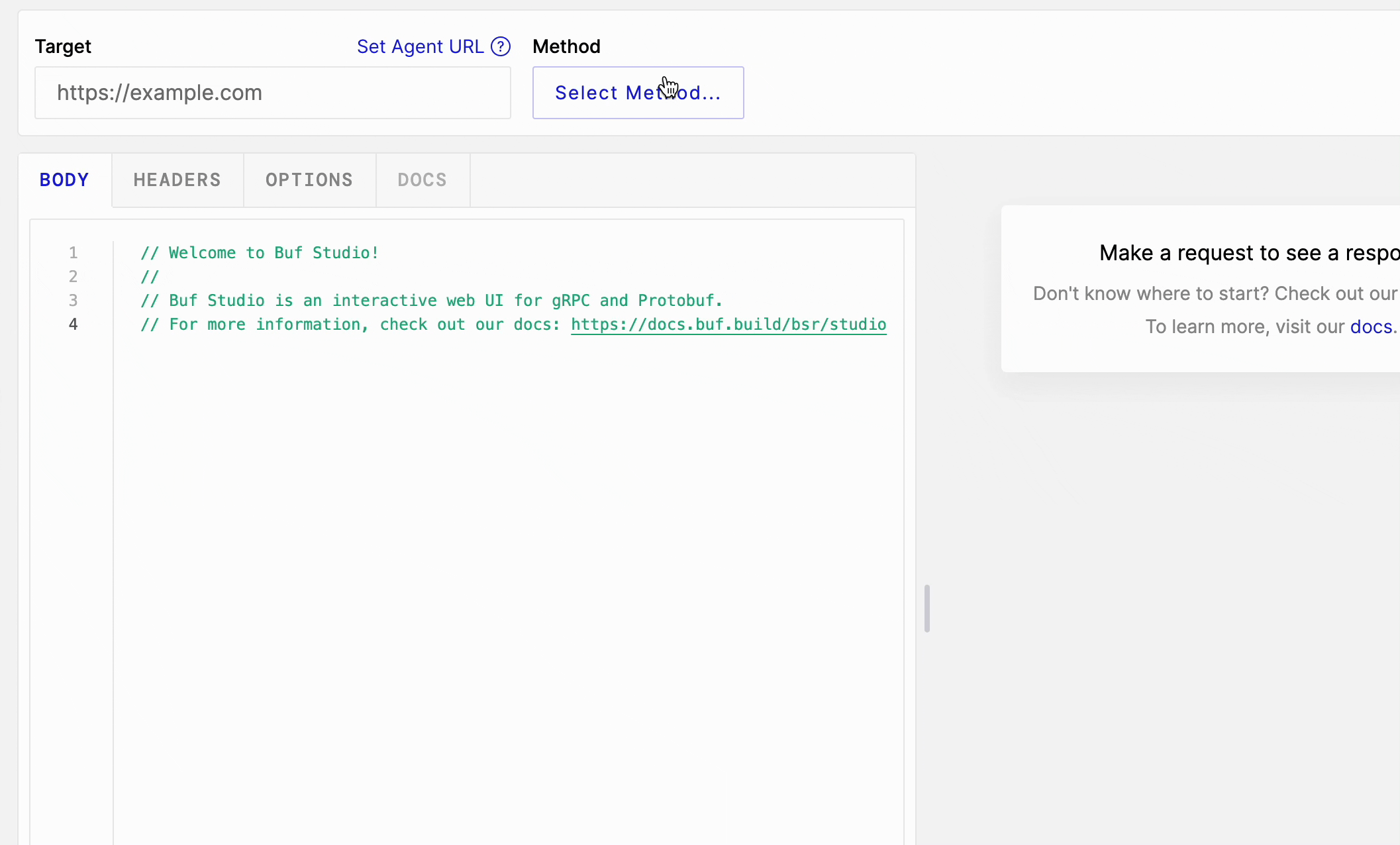
Note that the streaming endpoints are currently greyed out as Buf Studio currently only supports unary RPC. We intend to support streaming RPC in the future.
Once you've selected your RPC, declare the target URL of the Protobuf API that you're looking to make a request to. This should not include the service or RPC path, which Buf Studio will append based on your selected RPC definition.

Once you've configured your RPC and target URL, create the payload of your request using the Buf Studio's built-in editor. Based on the schema for your RPC's request message, the editor will give you:
- Autocompletion: use "ctrl + space" to trigger suggestions.
- Validation: invalid field types, invalid json, etc. The editor will underline the invalid region.
- Documentation: hover over fields, or use the "Docs" tab above the editor to view documentation for the Protobuf definition.
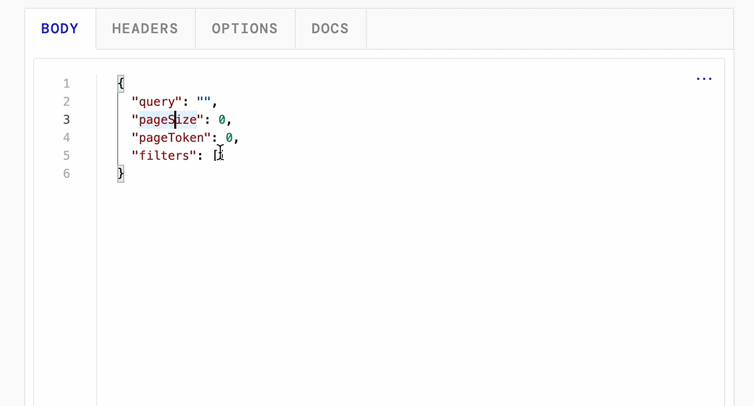
You can also set the headers for your request. This can be useful for any metadata you want to send through, authorization headers, etc.

Sending Requests
Once you've composed the request and are ready to call the API, Buf Studio can send it in two ways:
- Directly from your browser to the target API, or
- From your browser through a Buf Studio Agent proxy to the target API.
By making requests directly from the browser your requests stay private to you, in neither case the request is routed through Buf servers.
Direct
Without Buf Studio Agent, requests are made directly from the browser using the
standard fetch() API. This works great in combination with browser compatible
Protobuf servers such as Connect.
The server should be setup with a
CORS (Cross-Origin Resource Sharing)
policy permitting requests from https://studio.buf.build. CORS is a standard
HTTP mechanism used to indicate to browsers which origins are allowed to request
a resource. CORS has a variety of options and can be configured easily in most
popular server libraries and reverse proxies, it requires servers to respond
with the following header to make studio be able to receive a response:
Access-Control-Allow-Origin: https://studio.buf.build
Note that CORS policies can restrict the response headers studio is allowed to
access by the browser, be sure to configure Access-Control-Allow-Headers as
required by your use-case.
If you are unable to configure the target service to allow requests from studio,
you use Buf Studio Agent or a CORS proxy to reach the service instead.
Due to limitations in the design of the gRPC protocol, browsers are unable to communicate with gRPC servers. To use Buf Studio with servers that only expose the gRPC protocol, read on to the next section.
Via Buf Studio Agent
Buf Studio agent is tool that can be used to expand the use of Buf Studio to
protocols and servers normally out of reach for browsers. It is OSS that ships
as part of the buf cli and uses
connect-go to implement a small proxy
to unlock this extra functionality.
With Buf Studio Agent, the request flow is as follows:
When using Buf Studio Agent, studio can now also reach:
-
gRPC servers: The gRPC protocol is not able to be used with any major browser, however while browsers cannot use the gRPC protocol, Buf Studio Agent can! Communication between Buf Studio Agent and Buf Studio is handled in a with a protocol understandable by browsers, which Buf Studio Agent will dynamically reframe to communicate with the target server.
-
Servers without the required CORS configuration: as CORS is a browser specific limitation, Buf Studio Agent can issue requests to any server. The required CORS config is built into Buf Studio Agent by default, so the browser will be able to reach Buf Studio Agent which will forward your request to the target server.
To use Buf Studio Agent, configure the Buf Studio Agent URL in the UI with a URL to a running instance of Buf Studio Agent:

For more information on running Buf Studio Agent, see the reference section below.
Saving requests
Depending on request complexity, composing a well-formed and complete payload can take time and effort. To avoid repeatedly composing requests, you can save them to your profile for later reuse.
To save requests to your Favorites, first make sure you are logged in. All requests in the History section will have a star icon, and clicking on it will allow you to preserve the target url, request body, headers, and protocol.
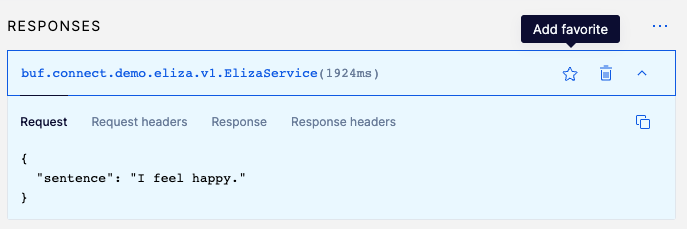
All Favorites appear on the left side of the editor, where you can rename, delete, or populate them back into the editor.
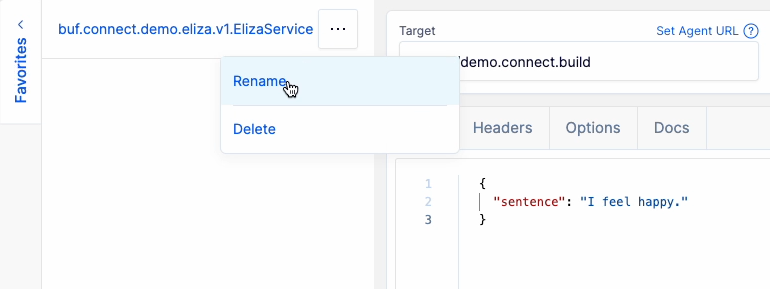
Once you load a Favorite back to the editor, you can modify it before sending it again!
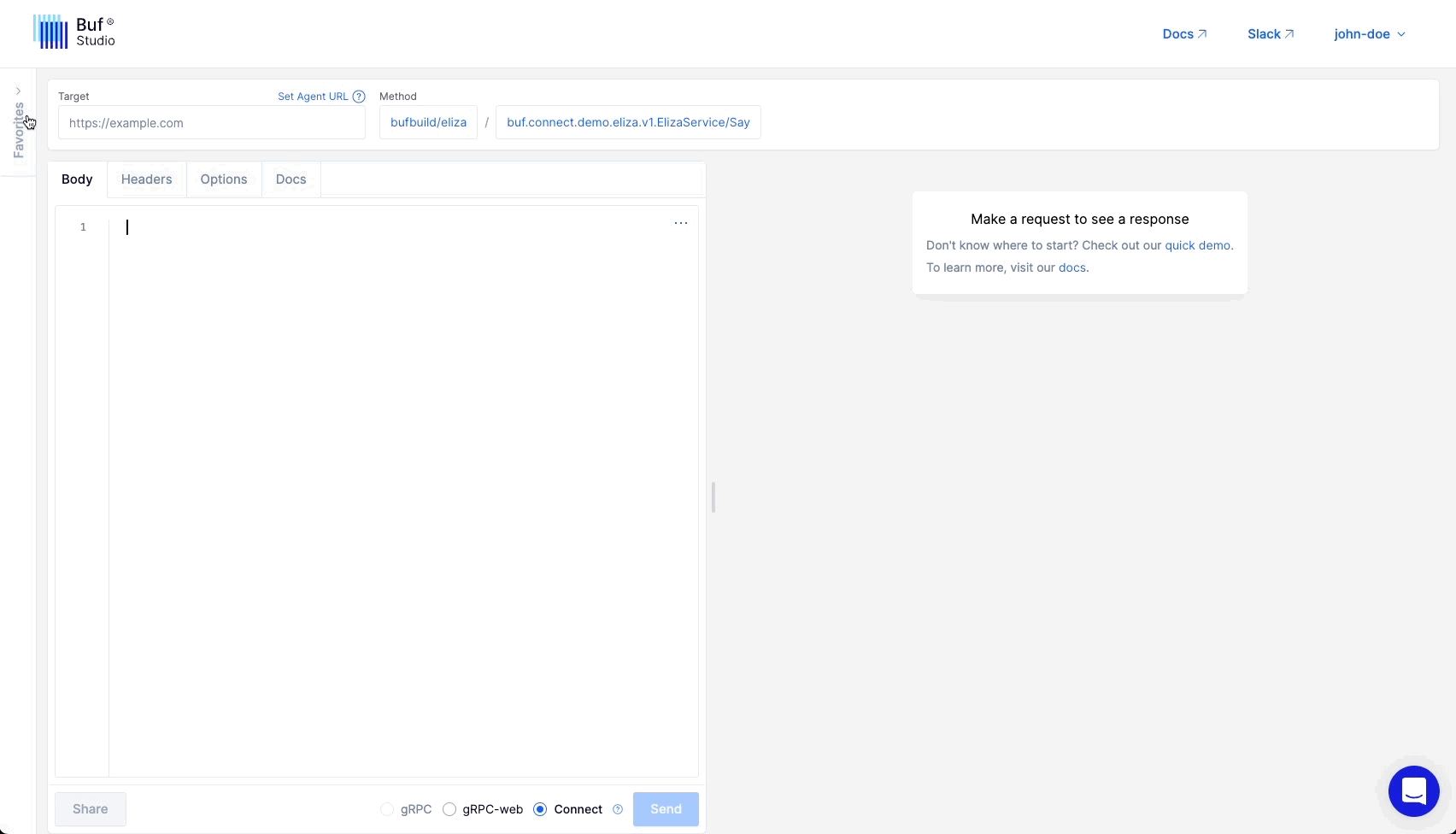
And as with any other request in-editor, you can share it with anyone using the “Share” button.
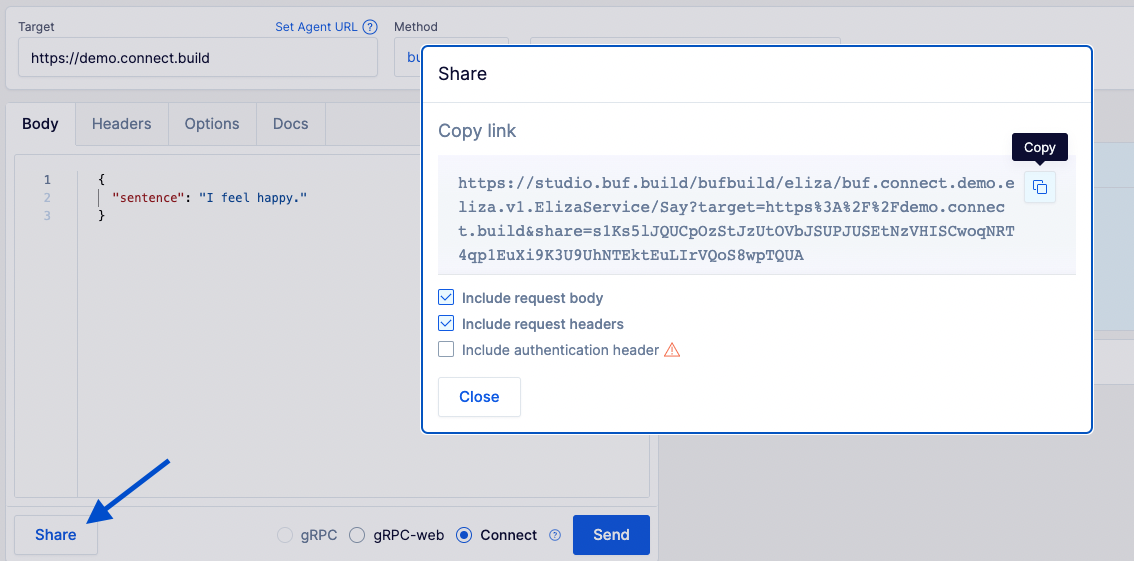
Advanced Setup
Cookies
Some APIs use cookies to authenticate requests. You can configure Buf Studio to include cookies with your requests by checking the following option:
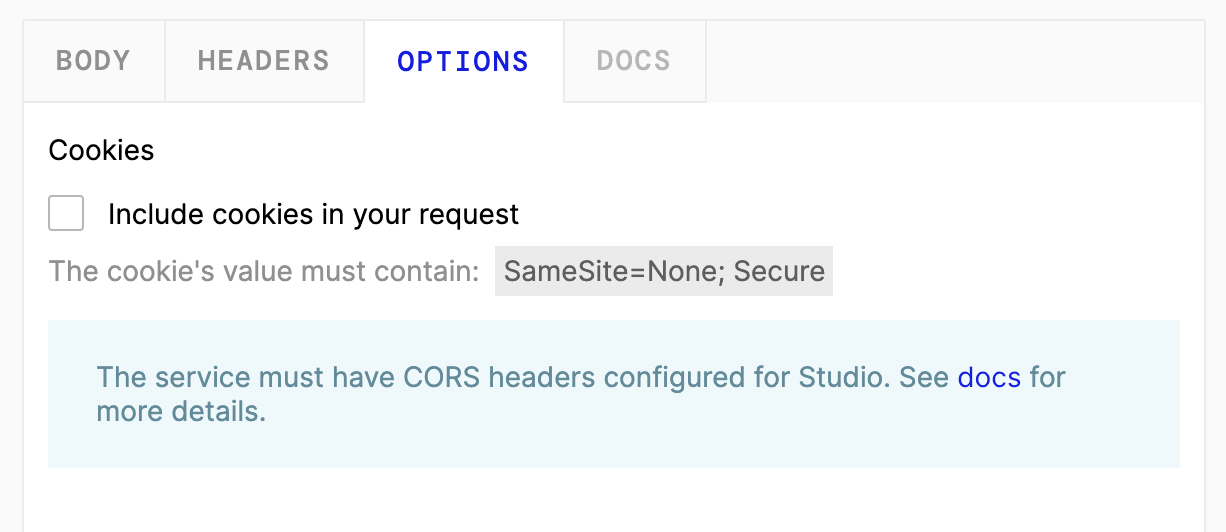
Cookies for the target URL need to contain SameSite=None; Secure to be
included in requests from Buf Studio. Servers that accept cross-origin cookies
for authentication should also use CORS to indicate to the browser that Studio
requests may include credentials by using the Access-Control-Allow-Credentials
header:
Access-Control-Allow-Origin: https://studio.buf.build
Access-Control-Allow-Credentials: true
Note: allowing credentials puts limitations on other CORS features such as using a wildcard for allowable response headers. Please refer to documentation on CORS to understand the requirements.
Long-Running Buf Studio Agent Instances
At Buf we deploy long-running Buf Studio Agent instances within our internal infrastructure. Their endpoint are protected by SSO and combined with the Cookies option described above this allows us to reach any public or internal Protobuf endpoint from Buf Studio. Together with our public and private APIs on the BSR, this setup allows us to test and debug any endpoint with ease.
With BSR Enterprise, administrators can configure default Buf Studio Agent URLs for anyone on their cluster. Combined with Cookies & Buf Studio Agent header forwarding, this transforms Buf Studio into the practical UI for any proto service at the company. Please reach out to learn more.
Reference: Buf Studio Agent flags
Buf Studio agent is included in the cli under buf beta studio-agent. This runs
an HTTP(S) server that forwards requests from the Buf Studio to the target URL.
buf beta studio-agent is available in CLI versions v1.5.0+
buf beta studio-agent
- Buf Studio Agent will start HTTP(S) server on the host and port provided:
bind- the hostname to bind to, defaults to127.0.0.1port- the port to bind to, defaults to8080
- Buf Studio Agent can be configured to make TLS requests
ca-cert- The CA cert used in the client and server TLS configuration.client-cert- The cert used in the client TLS configuration.client-key- The key used in the client TLS configuration.server-cert- The cert used in the server TLS configuration.server-key- The key used in the server TLS configuration.
- Buf Studio Agent can be configured to trim disallowed headers from an incoming
Buf Studio request (e.g. authorization headers, etc.)
disallowed-header- Disallowed header keys. Multiple headers are appended if specified multiple times.
- Buf Studio Agent can be configured to forward specific headers
forward-header- Forward headers are set in the format of--forward-header=fromHeader=toHeader. Multiple headers are append if specified multiple times.
- Buf Studio Agent can be configured to set specific accepted origins for CORS
policies
origin- Allowed origin for CORS, defaults to "studio.buf.build"
- For a long-running instance of Buf Studio Agent, an indefinite timeout will
need to be set with
--timeout=0s.